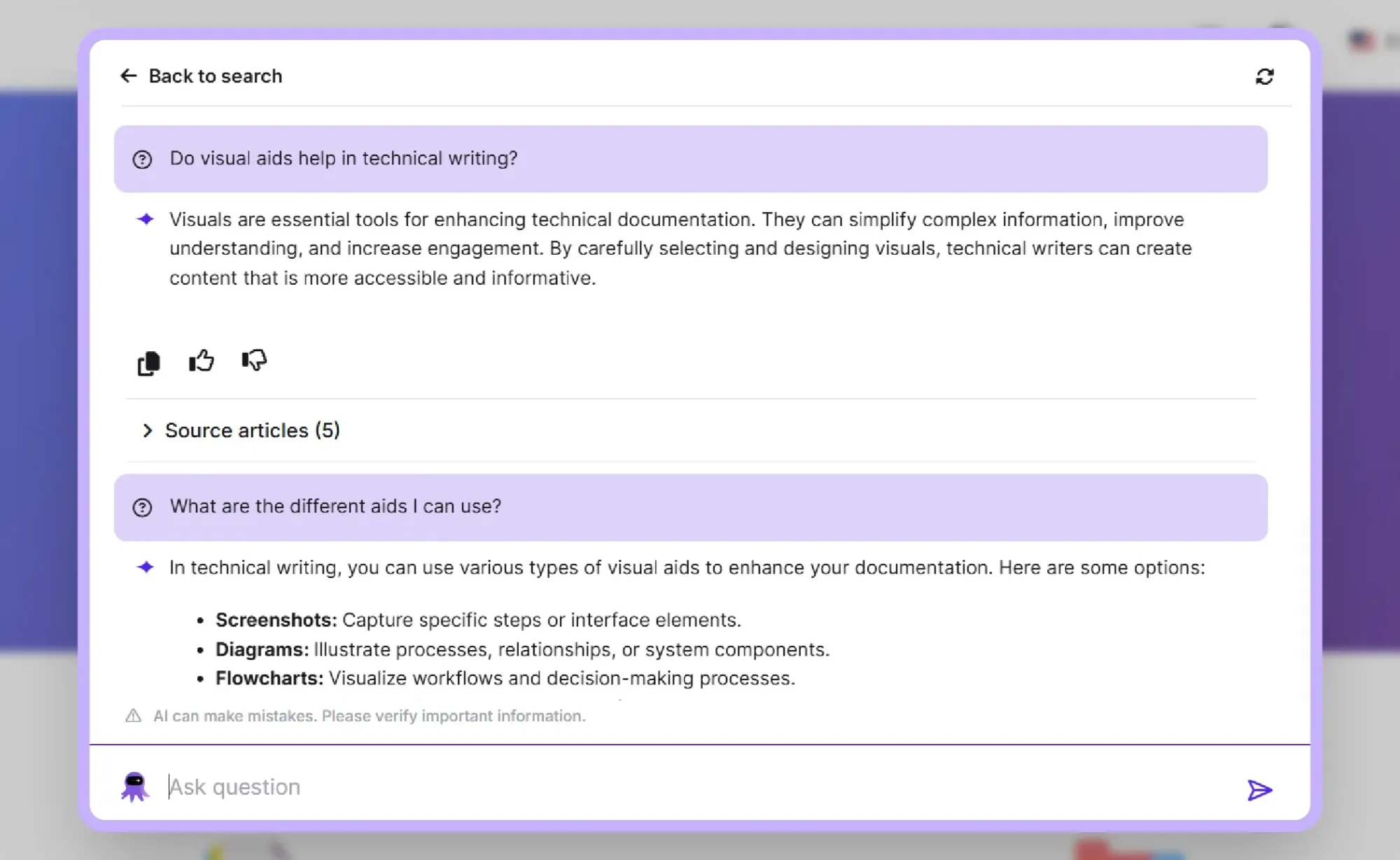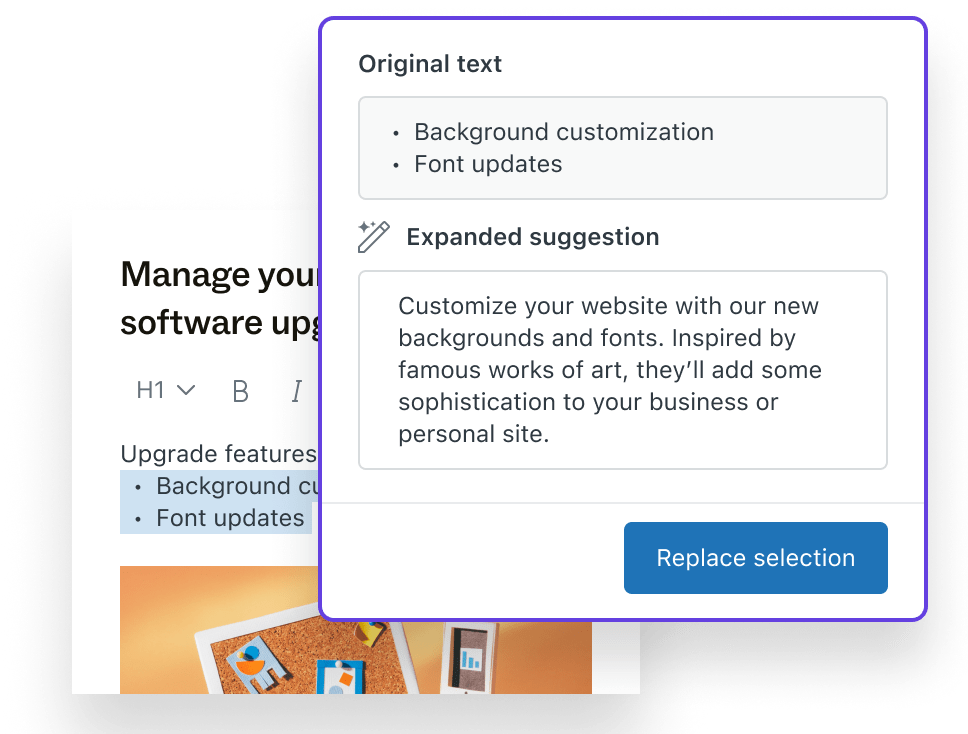
You're probably already using AI in your everyday life—both personally and at work. No longer do we have to think about how rude our email draft is. AI will make it sound professionally passive-aggressive (how far we've come, eh? 😭).
Jokes aside, AI is here to stay. One of the places it's made a huge impact is in customer support. Not only in ticketing and chatbots but Knowledge Base software.
But with so many AI tools available, it can be super overwhelming to determine which one is the right fit for your business. How can you know which one to go for?
Should you go for a tool that generates articles from scratch? One that enhances search functionality? Or an all-in-one AI-powered Knowledge Base that does everything under the sun but erratically?
Choosing the right AI for your Knowledge Base isn’t just about picking a flashy new tool—it’s about finding a solution that helps your customers and teams get the answers they need, faster and more efficiently.
A well-implemented AI Knowledge Base can save hours of work, reduce customer support tickets, and make self-service experiences smoother than ever. But pick the wrong one, and you could end up with an overcomplicated system that doesn’t truly meet your needs 😅
In this post, we'll dive into the rise of AI in knowledge management, explore the top AI-powered knowledge bases, and help you pick the best one for your business.
Let’s get started! 🚀
The Rise of AI in Knowledge Management
Knowledge Bases have always been essential for organizations looking to provide self-service options and improve internal knowledge sharing. They reduce tickets and educate teams.

With AI, these systems have become even more dynamic and efficient, offering users faster and more relevant answers. Here’s how AI can make a difference:
- Automated Content Creation: AI can generate and update articles automatically.
- Intelligent Search: AI understands natural language, so users don’t have to phrase their queries perfectly to get relevant results.
- Contextual Recommendations: AI suggests related content based on user behavior and previous queries.
- Continuous Learning: AI knowledge bases get smarter over time by analyzing feedback and interactions.
- Multi-Channel Support: AI-powered knowledge bases can be integrated with chatbots, social media, and voice assistants, ensuring users get the help they need no matter where they are searching.
How AI is Transforming Knowledge Bases
AI is fundamentally reshaping how businesses build, maintain, and leverage Knowledge Bases. These advancements are removing the traditional bottlenecks of knowledge management and making the process far more efficient and intuitive.

So, why are businesses jumping on the AI Knowledge Base bandwagon? Simple—it makes things easier and faster for your team! 🎯
- Faster Content Creation: AI-powered tools eliminate the blank page problem by generating drafts based on an initial idea or outline. This allows teams to quickly refine and publish high-quality content without spending hours starting from scratch.
- Faster Answers: AI chatbots and virtual assistants provide instant responses.
- Better Search Results: No more frustration from irrelevant answers—AI gets it right.
- Smarter Organization: AI auto-tags and categorizes content for easy retrieval.
- Insights & Analytics: AI helps businesses track what’s working and what needs improvement.
- Customer Support Automation: AI-driven tools are ingesting Knowledge Base articles to enhance automated support. By understanding the context of user queries, AI can serve up relevant articles, reducing the need for human intervention and improving response times.
With AI, knowledge bases are no longer just static repositories—they’re dynamic, constantly evolving resources.
Different Types of AI-Generated Documentation
AI can assist in creating various types of documentation, each suited for different use cases:
- Unstructured Wiki-Style Content: AI can automatically generate transcripts from meetings and summarize them into wiki-style pages. This is useful for internal knowledge sharing, project documentation, and informal collaboration.
- Structured Educational and Help Content: AI excels at creating clear, structured help articles, FAQs, and step-by-step guides. These are perfect for customer support portals and technical documentation (and it's what we provide 🙋).
- Automated Reports and Insights: AI can analyze data and generate detailed reports with insights, making it easier for businesses to track performance and key metrics.
- Chatbot-Driven Knowledge Responses: AI-driven chatbots can generate real-time responses based on a company’s knowledge base, improving customer support interactions.
- Training and Onboarding Materials: AI can assist in developing onboarding guides, training manuals, and e-learning content, streamlining the education process for new employees.
- Legal and Compliance Documentation: AI can help draft legal documents, contracts, and compliance policies by analyzing existing documents and structuring them accordingly.
Top AI Knowledge Base Options & Who They're Best For
So we've covered what an AI Knowledge Base can do for you—but what exactly is out there to choose from? Let's take a look:
1. OpenAI, Anthropic, and Deepseek AI

About: OpenAI, Anthropic, and Deepseek offer advanced NLP models such as GPT (OpenAI) and Claude (Anthropic). While they're not built specifically for writing Knowledge Base articles, they're totally capable of doing it.
Best for: Businesses looking for a highly flexible AI tool that'll create and develop plans, content, and suggestions. You'll just need to be comfortable with copy and pasting the content.
2. HelpDocs AI

About: HelpDocs (us!) is a self-service Knowledge Base platform that leverages AI to help businesses create and manage high-quality documentation. HelpDocs AI features allow for rapid content drafting, rewriting, section additions, and metadata generation, making documentation maintenance more seamless.
Best for: Companies that need fast, high-quality content creation and intelligent content optimization to improve customer self-service and internal documentation workflows.
3. Document360's Eddy AI

About: Document360 offers a robust knowledge management platform, and its AI assistant, Eddy AI, enhances search functionality, content recommendations, and tagging automation. This ensures efficient knowledge retrieval and organization.
Best for: Organizations that require chat-based, AI-driven search capabilities and features like AI article summaries and chart generation.
4. Helpjuice’s Swifty AI

About: Helpjuice is a knowledge management platform designed for easy customization and scalability. Their AI-powered feature, Swifty AI, assists with searching for answers and creating articles through an automated process.
Best for: Businesses looking for enhanced AI Knowledge Base search and a seamless way to create articles on the go.
5. Zendesk's AI Knowledge Base

About: Zendesk is a well-known customer service platform with a built-in AI-powered Knowledge Base. It enables companies to automate responses, add additional content to articles, and spot gaps in knowledge from their ticketing software.
Best for: Customer service teams that use Zendesk and want an all-in-one support tool that offers an AI-powered Knowledge Base.
How to Choose the Right AI Knowledge Base for Your Business
Picking the right AI Knowledge Base isn’t an easy task (which I'm sure you know by now 😅)—it needs to fit your business needs, enhance efficiency, and provide real value.
Here’s a deeper dive into what you should consider when evaluating your options:
AI Capabilities
Not all AI-powered Knowledge Bases are created equal. Some excel in content generation, while others are better at intelligent search or personalized recommendations.
Look for an AI that understands natural language well, provides contextually relevant results, and continuously learns from interactions to improve accuracy.
If your business requires extensive documentation, prioritize AI that can generate drafts, suggest improvements, and optimize metadata automatically.
Integration
Your Knowledge Base doesn’t operate in a vacuum. It needs to seamlessly integrate with your existing tools—whether that’s a customer support platform like Zendesk, a CRM, or team collaboration software like Slack or Microsoft Teams.

The more smoothly it fits into your workflow, the more valuable it becomes. Check for native integrations, API availability, and the ability to sync with other AI-powered customer support tools.
Customization & Scalability
A good AI Knowledge Base should adapt to your business, not the other way around. Can you tailor it to your industry’s specific needs? Does it allow branding and personalization?

More importantly, as your business grows, will it scale with you? Some AI tools offer limited flexibility, while others provide extensive customization options and support for large-scale enterprises. Choose a solution that meets both your current and future needs.
Cost & ROI
AI Knowledge Bases can vary widely in pricing—some charge per user, while others offer tiered pricing based on features or usage. While it may be tempting to go for the cheapest option, consider the long-term return on investment.
A slightly more expensive AI that significantly reduces support tickets and enhances efficiency will likely pay for itself over time. Look for customer testimonials and case studies that demonstrate ROI before committing.
Ease of Use
Even the most powerful AI Knowledge Base won’t be helpful if your team finds it difficult to use. A user-friendly interface, intuitive content management, and straightforward AI-powered features make a huge difference.
Test out different platforms with your team before deciding—if it’s too complex to adopt, it could end up being underutilized, negating its potential benefits.

Our content in monthly bitesized emails
Get our best content delivered straight to your inbox.
SubscribeChoosing the right AI Knowledge Base is about finding the perfect balance of intelligence, functionality, and usability. By carefully evaluating these factors, you’ll be well on your way to selecting a solution that truly enhances your business operations.
Finding the Right AI Knowledge Base for You
AI Knowledge Bases are changing the way businesses manage and deliver information.
From smarter searches to automated content creation, they help companies boost efficiency, improve customer support, and streamline internal documentation.

Whether you go with OpenAI, HelpDocs, Zendesk, Helpjuice, or Document360 the right AI Knowledge Base solution depends on your needs. The key is finding the perfect balance of automation, accuracy, and usability 😌




